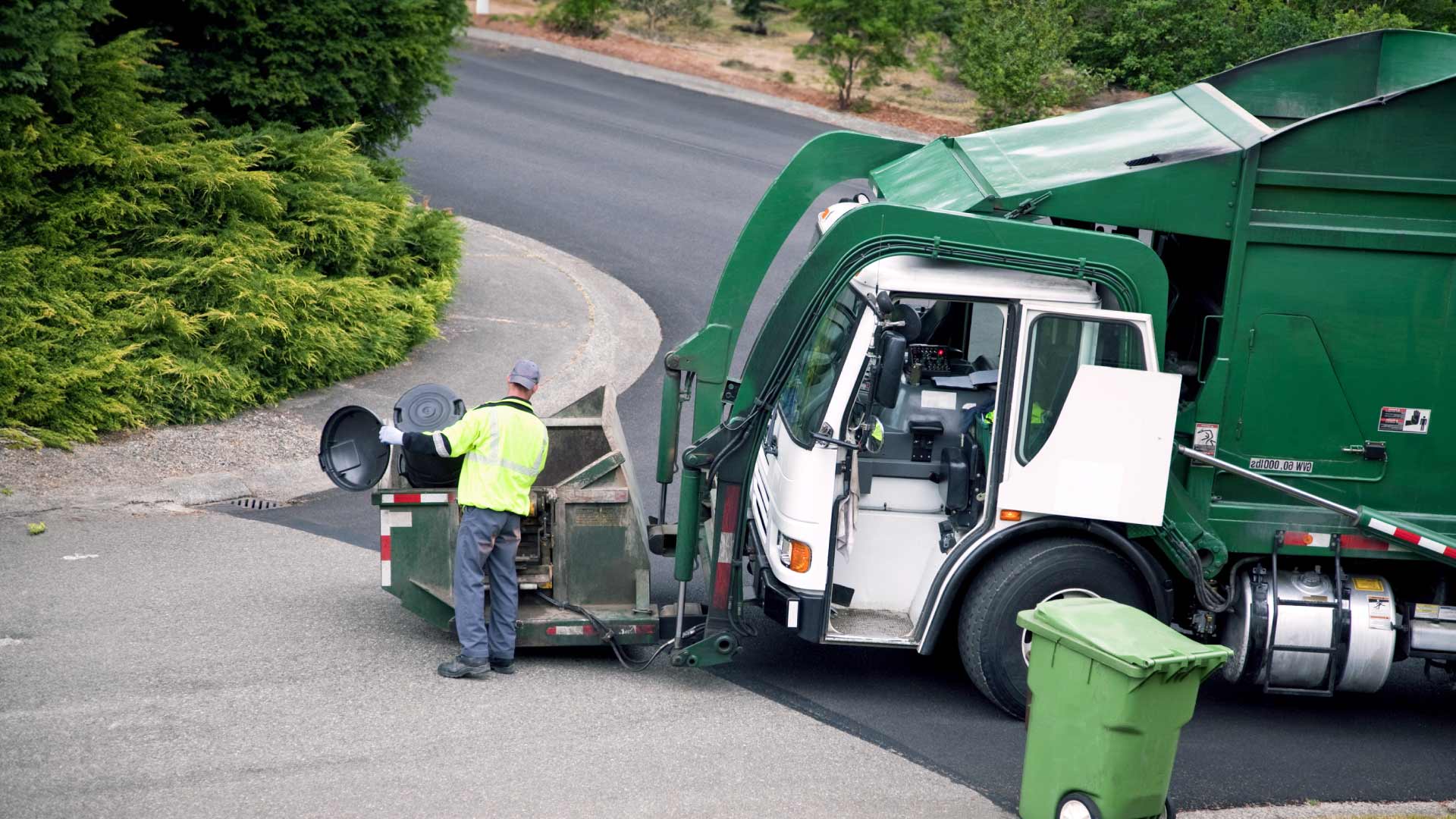Six ways telematics reduces costs for waste management fleets
Discover how telematics can cut costs for waste management fleets through optimized routing, proactive vehicle maintenance, accurate billing and enhanced efficiency.

By Nicki Schill
Sep 2, 2025

Key Insights
- Through enhanced operational efficiency, telematics helps waste management fleets combat downtime and lower costs of waste collection
- With improved vehicle longevity with preventative and predictive maintenance, telematics keeps waste management fleets on the road longer with better forecasting for vehicle replacement schedules
- Waste management fleet software can integrate with ERP and billing systems for precise billing and faster revenue recovery to streamline administrative processes and reduce overhead
Amid public scrutiny and tightening budgets, waste management companies are under immense pressure to either secure contracts, provide optimized service or reduce costs by relentlessly optimizing their operations. For commercial waste management companies, contracts are won and lost on the margins of cost-efficiency. For public waste management organizations, a strong reputation in the eyes of citizens is critical and comes from responsibly using taxpayer funds while still providing efficient service to their communities. No matter whether your waste and sanitation organization is in the private or public sector, in today’s environment, reducing waste management fleet costs has never been more critical.
Garbage trucks, which are the lifeblood of these operations, must be managed precisely to maintain cost-effectiveness and reduce the likelihood of downtime. This is where telematics technology makes the biggest impact. By implementing a waste fleet management software, teams can gain real-time insights into fleet health, pinpoint inefficiencies and help uncover substantial cost savings opportunities. With proactive oversight and data-driven decision-making, waste collection fleets run more smoothly and economically.
Here are six ways telematics can help reduce costs for your waste management fleet:
1) Reduce your liability risk
Telematics technology significantly reduces liability risks for waste management fleets in two ways:
- Boosting driver safety
- Protection against false claims
Boosting driver safety: Key features such as driver and fleet scorecards, integrated driver coaching and cameras are but a few of the tools that allow fleet managers to swiftly identify and address unsafe driving behavior, equipping teams with the knowledge to help prevent collisions before they occur. And with the advent of AI, the ability to help predict future collision risk is possible. For example, with Geotab’s Predictive Insights, our AI-enabled calculation takes into account specific attributes of your fleet and its operating conditions, then provides an accurate score of how likely your fleet is to experience a collision over its next 100,000 miles or kilometers. Using forward-thinking metrics like these, your waste and sanitation company can develop better safety policies and coaching drivers on best practices to drive down risk.
Protection against false claims
If a collision involving one of your waste collection vehicles does occur, it’s critical to know who was at fault to help promote safer driving, determine liability and potentially exonerate your drivers. Unlike eyewitness accounts, telematics data can serve as an impartial witness to the event, providing reliable and irrefutable evidence of what occurred. A telematics platform can collect and report relevant data through capabilities like these listed below.
Collision detection: When a telematics hardware device detects a collision, it will automatically detect the incident and report data about what happened, including accelerometer data at the time of impact, the collision’s GPS location and any corresponding braking data. Detect minor and major collisions with classifications based on severity of impact, which are graded based on the level of G-forces felt.
Collision reconstruction: This feature builds on the functionality of collision detection, enabling you to analyze insights on what occurred leading up to and immediately after an incident. Gain perspective on the point of impact, accelerometer data, speed profiles and other key metrics.
Camera integrations: Learn even more about collisions by adding video telematics to your operational toolkit. Integrating video telematics with your existing vehicle cameras can help you analyze critical footage that provides a truthful account of what caused an incident. These insights can help exonerate your waste collection drivers of wrongdoing and refute potentially fraudulent claims made by other involved motorists.
Did you know? Through Geotab’s Safety Center, you can study all of your fleet’s safety data from a single location and easily spot where improvements may be needed. Camera data can additionally be reviewed from MyGeotab’s Video Recordings section. Holistically analyze collision risk metrics, camera data and insights on driver behavior to gauge your fleet’s overall safety profile and make smarter decisions.
Learn more: Discover more about Geotab’s safety features by exploring our Safety platform tour.
2) Reduce the number of call backs
Call backs drive up expenses through increased fuel usage and additional employee hours, potentially leading to overtime pay. Telematics can significantly reduce the number of call backs you have to perform by helping you precisely track trucks and monitor pickups. Integrating telematics with a waste management routing software allows you to verify that all routes are completed as planned, lowering the chances of missed pickups. By having detailed records of each stop and route, managers can verify that services were carried out correctly, eliminating the need for costly return trips to missed locations. This boosts customer satisfaction, saves money and optimizes resource use.
- Accurate route tracking: Know when pickups were completed and where to eliminate missed stops.
- Enhanced service verification: Confirm completed pickups with detailed records to dispute missed collection claims.
- Higher customer satisfaction: Increase reliability and trust in the community with timely waste collection services.
3) Reduce your fuel spend
Telematics technology helps waste management fleets significantly lower fuel usage and costs by presenting data on fuel usage, idling trends and engine performance.
Telematics helps minimize the costs associated with excessive idling and inefficient driving by monitoring and analyzing driving behaviors and engine performance. Optimizing routes through telematics can also decrease unnecessary travel, lowering fuel expenses and carbon emissions.
- Lower idling costs: Minimize costs from excessive idling and inefficient driving.
- Optimized routes: Decrease unnecessary travel to save fuel.
- Lower emissions: Reduce carbon footprint through more efficient operations.
Cut costs, not corners: Learn the four key strategies to slash inefficiencies and boost savings in your fleet operations by downloading our waste management ebook.
4) Reduce your team’s downtime
Fleet management software provides teams with advanced tools to enhance efficiency and minimize downtime. By utilizing real-time data and predictive maintenance, these technologies enable waste management teams to optimize their operations, keep their vehicles in top condition and effectively manage their routes and schedules. Incorporating fleet management software can significantly improve operational performance and cost savings.
- Optimized vehicle maintenance: Telematics helps waste management companies optimize vehicle maintenance by providing real-time data and predictive analytics to identify potential issues before they become major problems, helping extend vehicle lifespans and reduce the chances of breakdowns.
- Enhanced route planning with integrations: Telematics integrations enable precise route planning and real-time adjustments based on traffic and waste collection progress, allowing you to complete routes more efficiently and reduce idle time.
- Timely intervention with regen alerts: Know precisely when it’s time to run a regen cycle and burn off harmful particulates from your trucks’ filters with automated reminders. For example, Geotab’s waste management fleet software offers features such as custom rules which you can set for notifications that help you stay on top of filter regen needs and take better care of your trucks.
Learn more: Discover how Ferrovial Servicios avoided overflow penalties, efficiently routed their vehicles and reduced costs using Geotab and integrated waste management solutions.
5) Lower your fleet’s total cost of ownership
Waste collection operates seven days a week with little downtime, making efficient maintenance management and vehicle longevity critical. Extending vehicle lifespans is essential, given the substantial cost of replacing waste collection vehicles, ranging from $200,000 to $400,000 each.
- Prolonged vehicle lifespans: Predictive maintenance scheduling helps identify potential issues before they become major problems, extending the life of costly vehicles and reducing the frequency of replacements.
- Reduce downtime and maintenance costs: Proactive maintenance planning and real-time vehicle health monitoring minimize the chance of unexpected breakdowns and expensive repairs.
- Better management of vehicle health: Comprehensive tools such as a maintenance center dashboard and DVIR history allow for precise tracking of vehicle health conditions and driver behavior, improving safety and promoting informed decision-making regarding vehicle utility and replacement cycles.
You stand to save more on fleet ownership when you calculate trucking cost per mile; making informed decisions can prolong the lifespan of your fleet and reduce unexpected expenses.
6) Decrease your administrative overhead costs
Telematics significantly reduces the administrative overhead and costs of manual paperwork in waste collection fleets. Paper route sheets and work orders are inefficient and increase the risk of errors, leading to increased operational costs. By automating these processes, fleets can significantly reduce expenses related to paper and printing while streamlining operations for greater efficiency. Integration with ERP and billing systems through an open API and software development kit (SDK) directly connects operations and billing, maximizing savings. Tracking overflow or additional waste collection helps keep the data relayed accurate, leading to precise billing and simplified management processes.
The City of Spokane faced similar challenges with manual processes hindering their operational efficiency. After implementing telematics solutions, they experienced substantial cost savings and operational improvements. The city now saves up to $25,000 annually in printing costs alone. Additionally, the automation of processes saves thousands of hours of cumulative staff time, allowing employees to focus on more critical tasks. Furthermore, optimized routes and integration with the new billing system will save hundreds of thousands of dollars over the contract's lifetime.
- Significant cost savings: Automation eliminates the need for paper route sheets and work orders.
- Enhanced efficiency: Automated processes free up staff time, allowing teams to focus on essential tasks and improve overall efficiency.
- Increased revenue potential: Integration with advanced systems keeps billing accurate and tracks additional collections, optimizing savings through precise data management.
Cutting costs and boosting efficiency with telematics
As we've discussed, telematics helps reduce liability risks, eliminate unnecessary return trips, cut fuel expenses, lessen downtime and lower administrative overhead. These improvements don't just drive down costs; they make operations smoother and more reliable. Geotab’s solution for waste management fleets helps both public and private waste organizations achieve these benefits through a best-in-class solution. It consists of Geotab GO devices and the MyGeotab platform, GO Analytics’ fleet and video data dashboard, VisionTrack’s AI video telematics and Routeware’s in-cab platform (for public waste and sanitation fleets). All of these technologies work seamlessly together to help you conduct more efficient pickups and reduce costs during daily operations.
Start your journey to a more efficient, cost-effective and safer waste management operation by leveraging the power of telematics. Transform your fleet through optimized routing, reduced liability, enhanced service verification and streamlined administration.
Visit this page to discover more about the Geotab advantage for waste management fleets.
Learn how telematics can help you optimize your waste fleet by downloading our ebook.
Subscribe to get industry tips and insights
Frequently Asked Questions
Yes, through Geotab's open API and Software Development Kit (SDK), telematics data can be integrated with your ERP and billing systems. This integration allows for accurate tracking of additional waste collections or overflow, keeping billing precise and helping streamline administrative processes to maximize savings.
Predictive maintenance uses near real-time vehicle health data to identify possible issues before they potentially become major ones. By understanding vehicle usage, engine hours and potential wear and tear, you can help extend the lifespan of costly waste collection vehicles. This data also helps in better forecasting vehicle replacement schedules, allowing for more strategic budget planning and reducing the frequency of expensive replacements.

Nicki Schill is a Marketing Manager, Public Sector Communications for Geotab.
Table of Contents
Subscribe to get industry tips and insights
Related posts

How to stop wasting mechanic hours on ‘ghost codes’ and low-priority repairs
February 2, 2026
2 minute read


.jpg)
Go beyond reactive truck maintenance with predictive solutions that drive profits
December 8, 2025
3 minute read

Law enforcement technology: Four trends to know for 2026
November 7, 2025
6 minute read

Four seasons of fleet intelligence with Geotab's Public Works solution
November 7, 2025
2 minute read